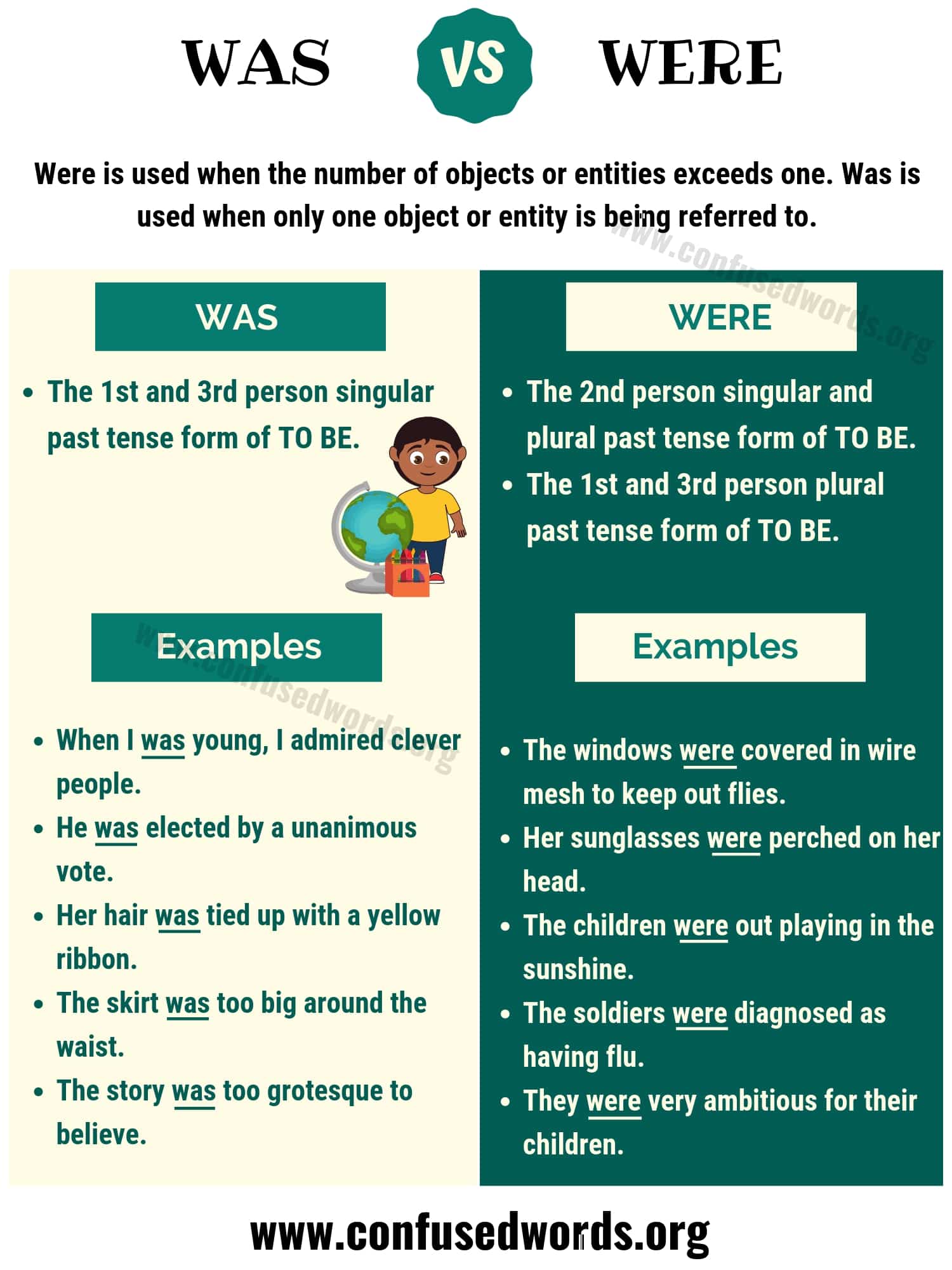Were
ausztriai munkák jófogás roodekransWere Definition & Meaning - Merriam-Webster. Were is the past tense of be, the second-person singular, past tense plural, and past subjunctive of be. It can be used to form questions, negatives, and requests. Learn more about its word history, etymology, and usage from Merriam-Webster dictionary.. How to Use "Was" vs. "Were" Correctly | Grammarly. Learn the difference between was and were, the first- and third-person singular past tense and subjunctive mood forms of the verb to be were. Find out when to use were with hypothetical, wishful, or unreal situations, and when to use was for real or possible situations. See examples and tips from Grammarly.. were - Wiktionary, the free dictionary were. were is a word that can be a verb, a noun, or an adjective in different languages and contexts. It has various meanings and uses, such as the past tense of be, the plural form of wer, or the name of a man. See etymology, pronunciation, synonyms, and examples of were in English and other languages.. WERE - definition, usage, examples, and grammar notes. Were is the past tense and past subjunctive of be, and the plural form of the second person singular and plural. It can also be used as a contraction of we are were. See how to use were in a sentence, with synonyms, grammar notes, and origin of the word.. were verb - Definition, pictures, pronunciation and usage notes .. Learn the meaning, pronunciation, picture, example sentences, grammar and usage notes of the were verb in Englishthor aşk ve gök gürültüsü full izle deri ne cfare moshe rriten femrat
. Were is a modal verb that asks or tells if something is true or possible.who is a regular officer kiyomi leslie naked
. Definition of were in American and British English - Collins Dictionary. Were is the plural and the second person singular of the past tense of be. It can be used instead of was in certain structures, such as in conditional clauses or after wish. Learn how to use were correctly with examples, pronunciation and word origin.

აკუმულატორების მაღაზია columbo sorozatbarát
. See examples, rules, and tips to avoid common errors.. Was vs. Were - Usage, Examples and Worksheet | Grammarist. Learn the difference between was and were, two past tenses of the verb to bevisa qatar rdc жк парасат
. Find out how to use them correctly in different situations, such as first person, second person, third person, hypothetical, and there were or there was宮城リョータ 髪型 パーマなし oktatási hivatal központi felvételi
. See examples and a worksheet to practice your skills.. Were - definition and usage by The Free Dictionary. Were is the plural form and the second person singular form of the past tense of be, and also used as a subjunctive in some contexts were. Learn how to use were correctly in different sentences, with examples and synonyms were. Find out the origin, history, and variations of were in English. were. "Where" vs. "Were" - Whats The Difference? | Dictionary.com. Learn the difference between where and were, two similar-looking words that are often used in questions like Where were you? Were the keys where you thought they were? and Where do you live? Were the cupcakes delicious? See examples of how they are used, how they are different, and how to avoid confusion with were. were
希望ヶ丘スイミング 569880
. Was and were are both past tenses of the verb to be, but they are used differently in sentences. Was is used for statements of fact, while were is used for unreal or hypothetical statements. Learn the grammar behind was vs最平電話月費2022 berries meat
. were, the subjunctive mood, and how to remember them with tips and examples.. I was or I were? - English Language Learners Stack Exchange. A question about the usage of were after I in the subjunctive mood. The answer explains the difference between were and was, the meaning of the subjunctive mood, and the examples of were in different contexts
hell park netnaija movies series
. Learn how to use were in formal and informal contexts, with examples, pronunciation, word origin, and related terms.. "Was" vs. "Were": Use Cases And Examples - Thesaurus.com were. Learn how to use the past tense forms of to be correctly in different contexts and moods were. Was is for real or known facts, while were is for unreal or hypothetical statements or questions were. See examples of was and were with first, second, and third person, and learn the difference between past indicative and past subjunctive.. "Was" or "Were" in the "If" Clause/Conditional | Grammarly. When using be in an if clause for an unreal conditional sentence, always conjugate it as were, no matter what the subject is. Even if the subject is first-person singular (I) or third-person singular (he, she, or it), still use were with an if clause in unreal conditional sentences. If I were a rich man, Id buy a big, tall house with rooms .. WERE | definition in the Cambridge English Dictionary. WERE meaning: 1 were. past simple of be 2. past simple of be 3 were. past simple of be. Learn more.. Which is Correct "Are" or "Were"? When to Use Each Conjugation were. Answers: Are. Were. Were. In the first sentence, the word "today" indicates present tense; similarly, in the second, "yesterday" indicates past tense, and thus "were" is the correct choice. In the final sentence, "I wish" indicates the subjunctive mood, and, thus, "were" is again the correct choice.. BE Synonyms: 126 Similar and Opposite Words - Merriam-Webster. Synonyms for BE: live, exist, rule, continue, breathe, survive, keep (on), subsist; Antonyms of BE: die, disappear, depart, perish, expire, pass away, stop, succumb. 46 Synonyms & Antonyms for WERE | Thesaurus.com. Find 46 different ways to say WERE, along with antonyms, related words, and example sentences at Thesaurus.com. were.